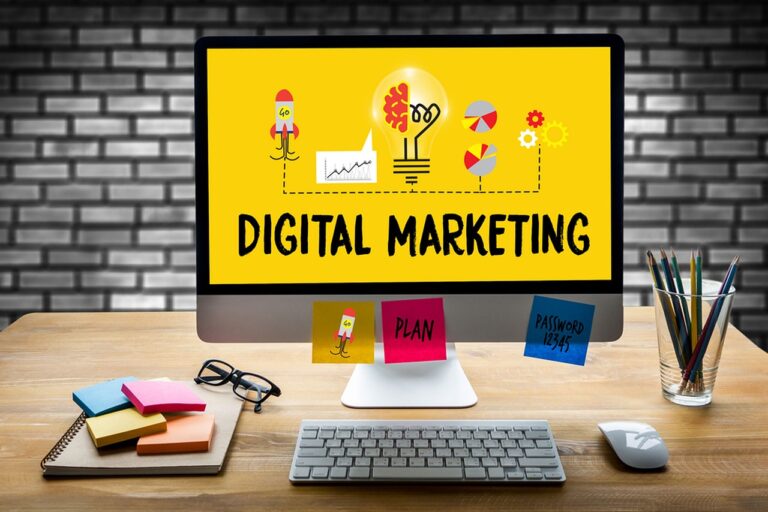
Small businesses have unique challenges in today’s competitive marketplace. With limited budgets and resources, finding cost-effective ways to reach and engage customers is essential. Digital marketing offers the ideal solution, providing the tools needed to compete effectively. But what makes digital marketing so powerful, and how can small businesses take full advantage of it?
- Cost-Effective Marketing
Digital marketing stands out as a highly cost-efficient approach, offering options to match the budget of small businesses. For example, a local bakery in New York might allocate just $100 per month to Facebook ads, reaching thousands of local customers at a fraction of the cost of print ads or billboards. Social media platforms like Facebook and Instagram enable businesses to create ads for targeted audiences, and email marketing platforms like Mailchimp offer free tiers to start with.
Real-life example: According to Forbe (December 2022), a local fashion boutique in London increased its online sales by 30% within six months by investing just $500 per month in Google Ads and retargeting Facebook campaigns. This growth wouldn’t have been possible with traditional marketing tactics, demonstrating the effectiveness of digital strategies for small businesses.
- Targeted Audience Reach
Digital marketing’s power lies in its precision targeting. For instance, an online store selling eco-friendly products can target environmentally conscious customers by using filters based on location, age, interests, and behavior on platforms like Facebook or Google. By doing so, businesses avoid wasting money on uninterested customers, ensuring every dollar spent brings them closer to valuable leads.
A local business owner in California shared their experience in Entrepreneur Magazine (March 2023): “We used Facebook ads to target residents within a 10-mile radius of our coffee shop. We customized our ads based on the customer’s online behavior, focusing on those who had an interest in gourmet coffee. Within two months, our walk-in traffic doubled.”
- Increased Online Visibility
With more than 5 billion daily internet users worldwide, a small business can’t afford to ignore its online presence. Utilizing search engine optimization (SEO) is vital for small businesses to appear in search results when potential customers are looking for products or services. By using SEO strategies like optimizing your website with relevant keywords and creating valuable content, businesses can rank higher on Google.
For example, a local gym might create blog content about fitness tips, which includes keywords like “best workout plans” or “local gym membership deals.” This type of content helps improve the website’s ranking, making it easier for people searching for gyms in the area to find them.
- Improved Customer Engagement
One of the major benefits of digital marketing is its ability to enhance engagement. Small businesses can use social media platforms like Instagram, Twitter, and LinkedIn to interact with their audience directly.
For example, a small clothing store in Toronto used Instagram stories to run a poll asking customers about their preferred fabric for new arrivals. This not only engaged the audience but also provided insights into customer preferences. As a result, the store was able to stock the right products and saw an increase in sales.
Customer engagement can also come from utilizing email marketing campaigns with personalized offers. According to HubSpot (July 2023), 72% of consumers respond positively to email offers tailored to their previous purchase history.
- Better Measurability and Analytics
The beauty of digital marketing lies in its ability to track and measure results in real time. Tools like Google Analytics, Facebook Insights, and HubSpot provide comprehensive data on traffic, conversion rates, bounce rates, and much more. This data helps business owners adjust strategies that aren’t working and double down on ones that are.
For instance, a small bakery could track the performance of an email marketing campaign promoting new cake flavors. By analyzing the open rates, click-through rates, and conversions, they can see what works best and adapt their campaigns accordingly.
- Leveling the Playing Field
Digital marketing offers small businesses the chance to compete with larger corporations. A well-executed digital strategy can help a business rank alongside industry giants.
Take the case of Dollar Shave Club, which started as a small business with minimal marketing resources. Through a well-targeted digital marketing campaign, they disrupted the men’s grooming industry and built a billion-dollar brand. This shows that with the right approach, even small businesses can make a significant impact in their industry.
- Enhanced Brand Awareness
Building brand awareness online can be more effective and long-lasting than traditional methods. Content marketing—through blog posts, videos, and social media—lets small businesses share their story and connect with potential customers. As more people see your brand, trust builds, and conversions follow.
For example, a vegan skincare brand might produce educational videos on YouTube about the benefits of plant-based products, building an audience of like-minded consumers who eventually convert into loyal customers.
- Increased Sales and Lead Generation
Digital marketing doesn’t just increase visibility and engagement—it directly impacts the bottom line by increasing sales and lead generation. Through strategies like email marketing, retargeting ads, and special online promotions, small businesses can see measurable increases in both leads and sales.
A personal trainer in the UK, for example, used Google Ads to promote his online fitness programs during the pandemic, driving traffic to his website and converting leads into customers. His online sales grew by 50% within three months, showing how effective digital marketing can be in times of crisis.

Beyond Traditional Digital Marketing: Growth Strategies for Small Businesses
While digital marketing is incredibly powerful, small business owners should also focus on additional strategies to grow their businesses effectively. Here are five types of businesses that can particularly benefit from these approaches, along with why and how they can implement them:
- Local Cafés and Restaurants
Why: Cafés and restaurants thrive on community engagement and word-of-mouth marketing. By partnering with complementary businesses and focusing on customer loyalty, they can boost their foot traffic and customer retention.
How: A local café could collaborate with a nearby bakery to offer joint promotions like “Buy a coffee, get a pastry half off.” Additionally, launching a loyalty program where customers earn free items after a certain number of purchases can encourage repeat visits. Participating in local food festivals or sponsoring community events can further increase visibility and brand awareness.
- Boutique Retail Stores
Why: Boutique stores often rely on loyal customers and community goodwill. Referral marketing and customer loyalty programs can help them stand out against bigger competitors.
How: A boutique clothing store can create a referral program that rewards customers who bring in friends with discounts. They could also collaborate with local jewelry or accessory makers to cross-promote products. Organizing small community fashion events or workshops will further boost engagement with the local audience.
- Gyms and Fitness Studios
Why: Fitness businesses benefit immensely from referrals, community involvement, and loyalty programs, as customers are more likely to stick with a gym if they feel part of a community.
How: A gym could introduce a loyalty program where members get discounted personal training sessions or free classes after reaching a specific number of visits. Partnering with a local nutritionist or health food store can create joint promotions, encouraging gym-goers to adopt healthier lifestyles. Hosting charity fitness events or free community classes can also generate interest and new memberships.
- Salons and Spas
Why: Salons and spas rely heavily on repeat business and customer referrals. Offering exceptional customer service, loyalty programs, and local partnerships can ensure a steady stream of clients.
How: A spa could collaborate with nearby wellness-related businesses like yoga studios or skincare brands to offer joint wellness packages. Creating a loyalty program where clients receive a free service after a certain number of visits can increase customer retention. Hosting community beauty or wellness workshops will further build brand recognition within the local community.
- Local Service Providers (e.g., Plumbers, Electricians, Contractors)
Why: These businesses often grow through word-of-mouth and referrals. Trust is critical, and referrals from satisfied customers can be invaluable for their growth.
How: A local contractor can create a referral program offering discounts to clients who refer friends or neighbors. By partnering with real estate agents or property management companies, service providers can access a steady stream of potential clients. Engaging with the community by sponsoring local events or offering free consultations can also build trust and increase visibility.
—————————————————-
Final Thoughts: Empower Your Small Business with Digital Marketing
Digital marketing offers unparalleled opportunities for small businesses to grow, engage customers, and build a strong brand presence. By combining cost-effective strategies with data-driven insights, you can elevate your business above the competition.
If you’re ready to take your digital marketing efforts to the next level, reach out to Abdul at 916-778-5979. With over five years of experience in digital marketing, business insurance, and home/auto coverage in the UK and USA, Abdul can help guide your business toward sustainable growth and success.
Let’s build your future—digitally!
